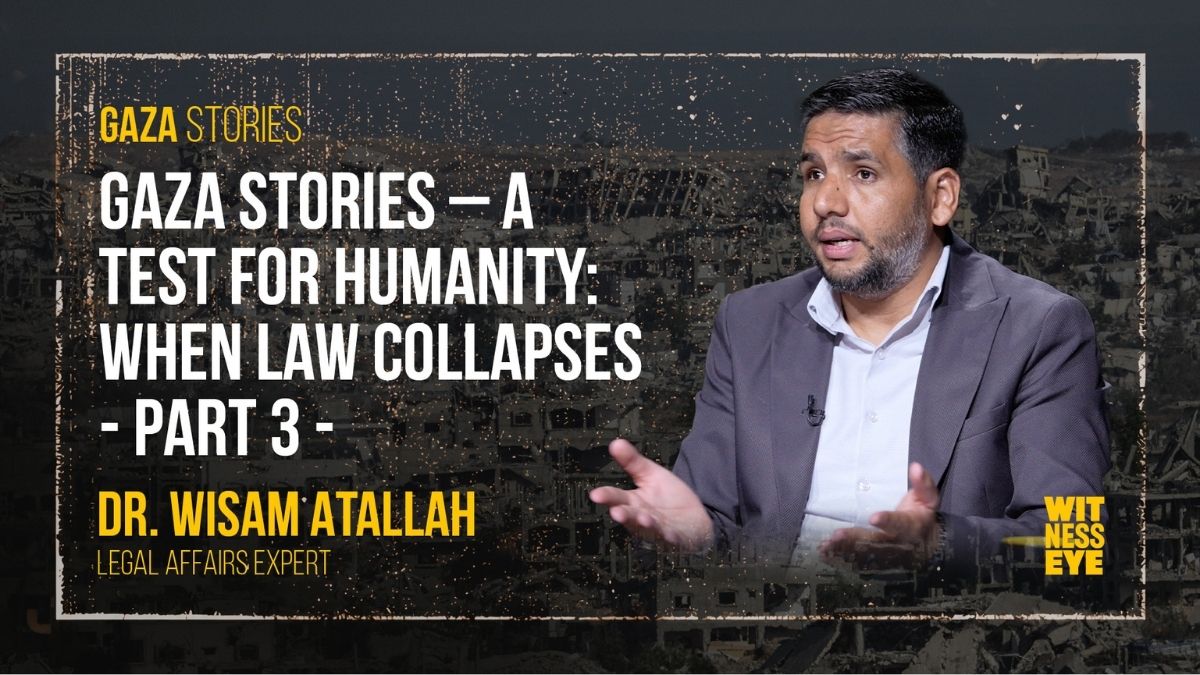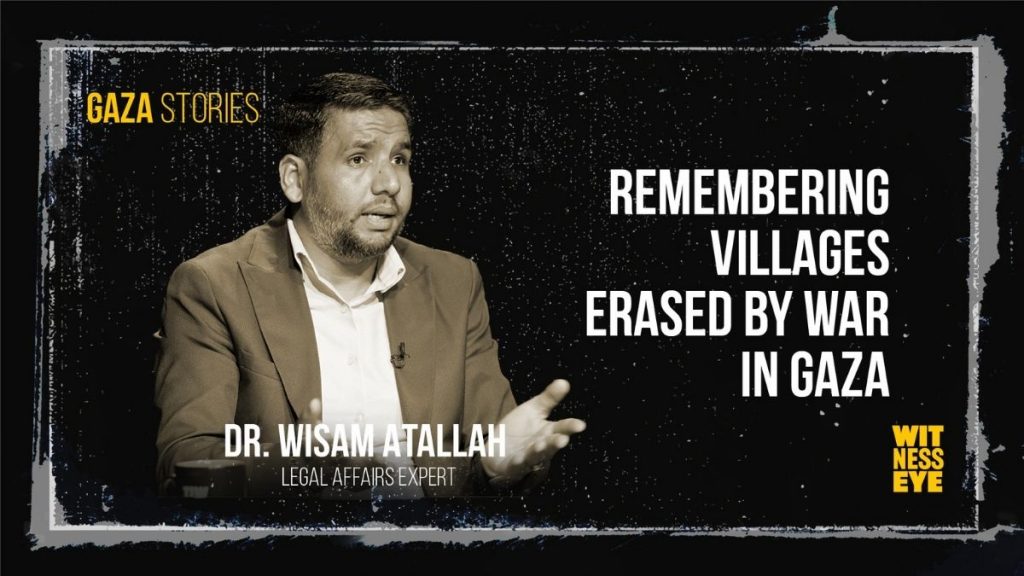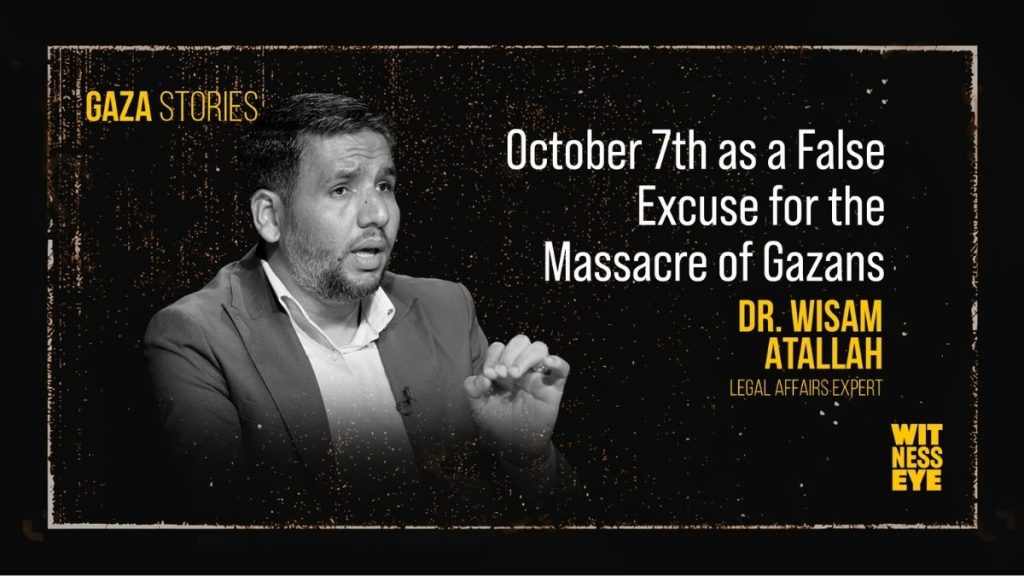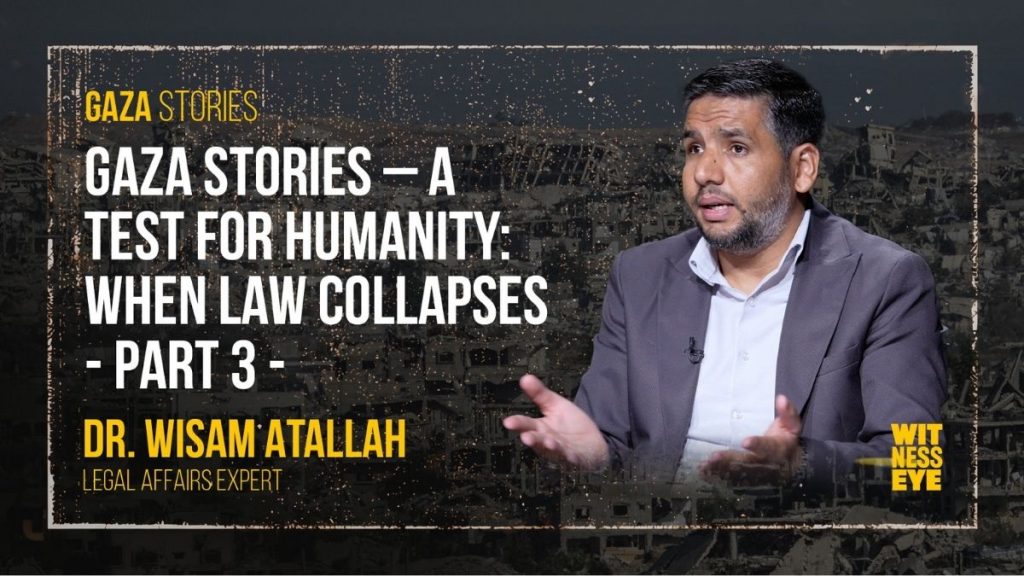
The third part of Gaza Stories – A Test for Humanity: When Law Collapses reminds us that wars are never only about battlefields. They are about memory, erased villages, and the silence of doors locked for a return that never came. Dr. Wissam Atallah’s testimony brings this to life, showing how the story of Damra—renamed and militarized as Erez—stands as a symbol of the Nakba’s continuity, forced displacement, and the generational wound that exile engraves into family histories. What is at stake here is not only land but the survival of identity and the refusal to let memory be extinguished.
At the same time, these narratives challenge the way global politics reduces Palestine’s struggle to moments like October 7. They show that the roots stretch far deeper—into colonial policies, mass expulsions, and the normalization of hatred as doctrine. Through themes of steadfastness in the face of destruction, the illegality of forced deportation under international law, and Israel’s unprecedented political and legal losses, the text moves beyond tragedy into defiance. In this sense, Gaza’s ruins are not simply ruins of homes; they are the ruins of justice itself, urging the world to reckon with its silence and its complicity.

Remembering Villages Erased by War in Gaza
Dr. Wissam Atallah often returns to the story of his grandmother, born in 1922 in Damra, a Palestinian farming village in northern Gaza. Today, that same land is renamed Erez, known only as a military crossing under Israeli control. For him, Damra’s disappearance is not merely about geography—it is about the erasure of memory itself.
His grandmother described how the British Mandate opened the way for armed militias and settlers, while Palestinian farmers were crushed by heavy taxes. Families who once lived from wheat and citrus found themselves stripped of livelihood and dignity. When the Nakba came in 1948, Arab armies urged villagers to leave for “two weeks,” promising a swift return. Families locked their doors, carrying only keys, convinced displacement was temporary. But those “two weeks” stretched into nearly a century.
She died in Jabalia refugee camp in 2011, never setting foot in Damra again. For Dr. Wissam, the key she carried was more than a token of return—it was a reminder of betrayal, of promises made and broken, of history itself abandoning its word.

October 7th as a False Excuse for the Massacre of Gazans
In the present war, Israeli leaders insist on framing everything through October 7th. Dr. Wissam dismisses this as a deliberate distortion. “Our struggle did not begin on that day,” he insists, recalling how even the UN Secretary-General recognized that the roots of resistance lay in decades of occupation and violation. The claim that violence erupted suddenly, without context, is for him a rewriting of history.
He points to moments etched into Palestinian memory: the First Intifada of 1987, when children faced soldiers with stones; the image of Muhammad al-Durrah, a boy shot while clinging to his father’s side; and, more recently, the desperate voice of Hind Rajab, a child pleading for help over the phone before being killed. “There were no rockets in their hands,” Wissam stresses. “Only fear and pleas for survival.” October 7th, for him, is not a beginning—it is a pretext, wielded to justify decades of systematic violence.
Gaza: Steadfastness Despite Destruction
In January 2025, when the guns briefly fell silent, people from the south of Gaza began walking back north. They knew what awaited them—streets turned to dust, houses crushed to the ground. More than 100,000 tons of explosives had scarred the land, a force greater than Hiroshima and Nagasaki combined. There was no electricity to light a single room, no schools for their children, no hospitals to ease their wounds. Still, they returned. For them, stepping back onto that broken soil was not about comfort—it was about refusing to let go of home.
For Dr. Wissam, this return was not driven by nostalgia but by defiance. International law recognizes forced displacement as a war crime, and Palestinians resist by insisting on their right to remain. “To remain on the land,” he explains, “is to remain alive as a people.” In Gaza, survival is not only biological but political, an act of will to refuse another 1948.
A Century-Long Struggle of the People of Gaza
Dr. Wissam reminds us that what unfolds in Gaza today cannot be measured only in decades since 1948. The roots run deeper. He traces them back to 1897, when the Basel Conference gave political Zionism its first platform, and to 1917, when the Balfour Declaration promised Palestine as a homeland for Jews. Under the British Mandate, settlers kept arriving from Europe, shielded by colonial law. This timeline matters, he argues, because it dismantles the myth that resistance emerged suddenly or irrationally. “Occupation began long before 1948,” he explains. “The Nakba was not a single event but the culmination of decades of preparation.”
Gaza: Target of a Politics of Hatred
One of the most disturbing truths, Dr. Wissam argues, is that hatred itself has been institutionalized. He cites Israeli flag marches where chants of “Death to Arabs” reverberate through Jerusalem. “Not just death to Palestinians,” he emphasizes, “but to Arabs as a whole.” This is not mere rhetoric—it is a doctrine, reinforced through education, politics, and public rituals.
He recalls Netanyahu’s religious framing of the war—invoking Gideon’s chariots or the “war of resurrection.” Such language transforms political violence into a sacred mission, making it harder to challenge. “When hatred becomes theology,” Wissam warns, “it threatens not only Gaza but the entire region.” Drawing on the proverb, “I was eaten the day the white bull was eaten,” he cautions that silence before Gaza’s suffering risks allowing this ideology to spread unchecked, consuming others as it already consumes Palestinians.

Israel’s Political and Legal Losses
Despite the devastation inflicted on Gaza, Dr. Wissam highlights Israel’s unprecedented political and legal losses. For the first time in history, Israel was brought before the International Court of Justice to face charges of genocide. Advisory opinions condemned its practices as systematic violations of international law, while the International Criminal Court went further, issuing arrest warrants against Netanyahu and Defense Minister Gallant.
“These steps are not symbolic,” he stresses. “They mark the erosion of Israel’s shield of impunity.” Dozens of countries—from Brazil to South Africa—severed ties or downgraded relations. Others, including five European states, formally recognized Palestine during the war. “These outcomes,” he says, “were unimaginable for Israel before Gaza. They came only because of the crimes committed here.”
Gaza and the Collapse of Illusions
Hope, Dr. Wissam observes, emerges not only in courtrooms but also in the streets, in London ‘the very city where the Balfour Declaration was issued’ hundreds of thousands marched for Gaza. Across U.S. campuses, students reignited traditions of dissent, confronting universities and government alike. “These movements show that people see through the lies,” he says.
He highlights the contradictions now faced by European governments—long champions of “human rights” and “rule of law”—as Israel openly defies international rulings while the United States shields it with vetoes. “Concepts have changed,” he reflects. “When citizens witness such hypocrisy, the very foundations of political faith collapse.” Painful as it is, he sees this collapse as necessary—a chance for societies to rebuild their values on truth rather than illusion.
The Struggle of Gaza That Cannot Be Silenced
For Dr. Wissam, the Palestinian struggle is both legal and generational. It is about defending land and defending memory. “Rights do not expire,” he insists. Nor does the will of Palestinians to exist. Every testimony, every march, every court ruling, he explains, is a seed planted for the future.
He ends with a warning: silence is complicity. “What is at stake is not only Gaza’s survival,” he concludes, “but the survival of law, morality, and humanity itself. Palestinians will never give up their rights—and the world cannot afford to give up on justice.”
Dr. Wissam’s testimony does not allow neutrality. It reminds us that the ruins of Gaza are not only shattered homes, but the ruins of justice itself. Each orphaned child, each bombed hospital, each silenced journalist demands an answer to the same question: what is the value of law if it cannot protect the innocent? Hear the testimony of Dr. Wissam Atallah—an academic, survivor, and voice of Gaza—exposing the collapse of international law, the silence of global institutions, and the unbroken resolve of a people demanding justice.
Stay Connected with Witness Eye
Follow us on our official channels:
